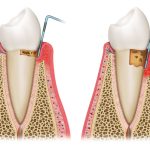Is It Possible to Have Teeth Problems Even with Proper Brushing and Flossing?
October 04, 2013
by Kerrisdale Dentist
Comments are off

Unfortunately, you don’t keep generating teeth throughout your entire life. Once you lose your baby teeth, the permanent set is all that you are going to get. Therefore, it is extremely important to incorporate an excellent oral care routine into your life to avoid teeth problems. Daily brushing and flossing is an essential aspect of this strategy, but are they enough to keep you from developing teeth problems?
Developing Teeth Problems: Acid Erosion
Even though you brush and floss your teeth every day, you can still develop problems with your teeth. Some of the foods and beverages you ingest create acid erosion on your teeth, wearing off the enamel through a process known as demineralization. As a result, your teeth lose their enamel, making them susceptible to damage. In fact, daily brushing creates an abrasive action that can strip away enamel that has been softened by acid erosion. Soda, fruits, juices, and wine fall into this category of acidic foods and beverages.
Teeth Problems: Fractured and Chipped Teeth
While brushing and flossing is great for keeping your teeth clean, it is still possible for you to have teeth problems. Whether or not your teeth have become weakened by acid erosion, you can still chip or crack a tooth. Eating foods that are extremely hard (jaw breakers, hard candies, ice cubes) can break a tooth. Once this happens, you need to go to the dentist to have it repaired as soon as possible. Waiting too long can allow tooth decay to set in. If you continue to wait, a bacterial infection can occur, giving you even more teeth problems to worry about.
Can You Have Teeth Problems Even with Proper Brushing and Flossing?
As you age, your teeth become more susceptible to damage. This is partly because of the damage that has accumulated over the years as well as partly because of the alignment of your teeth or fissures in your molars. Teeth that are crooked are more difficult to clean, so cavities can develop more easily. Deep crevices in the molars can hide food debris even though you brush regularly, possibly leading to teeth problems.
Tongue and Lip Piercings and Oral Health: What Are the Side Effects?

It’s a popular trend lately to pierce your tongue or lips. Yet are there potential side effects? What are the consequences of oral piercings for your mouth? According to dental experts, there are health risks associated with lip and tongue piercings. The health risks may affect oral health as well as general health.
Risks for Teeth
Damage to teeth is a serious risk associated with piercings of the tongue and lips. First, lip and tongue jewelry can chip or crack teeth. They can also damage fillings. Furthermore, the piercings can affect eating. Oral jewelry, the mere presence of it, can lead to an increase in the mouth’s saliva production. The excess saliva can cause problems for both chewing and swallowing.
Gum Problems
The gums are at increased risk from oral piercings, too. Oral jewelry contains metal; this metal can cause the gums to recede away from a tooth or teeth. Biting down on a jewel may scratch or even cut the gums causing them to bleed and leaving them prone to infection.
Overall Health Risks
Oral piercings can cause other problems for health. Piercings can strike a nerve and lead to nerve damage. This nerve damage can lead to a numbed tongue—a quite common practice. Often this is a temporary problem; however, the nerves in the tongue can also be permanently damaged. This damage can prevent a person from moving their tongue and even tasting.
Oral piercings can also leave the body prone to infection, particularly since many types of bacteria are contained in the mouth. Piercing sites are especially prone to infection. More seriously, diseases like Hepatitis B and C have also been associated with piercing sites. Hepatitis, of course, can lead to serious complications.
From systematic infections to cracked tooth syndrome, oral piercings can lead to significant oral and general health problems. Both dentists and doctors have encountered these problems that have been documented in major medical publications in Canada and abroad. While trends come and go, some of these problems can be permanent. To ward away the risks, it’s safest to avoid piercing your lips and tongue.
Gum Disease – Everything You Need to Know

The majority of adults in the western world show some signs of gum disease, even if they’re only minor. Many of these people will have no idea about it, as mild gum disease is unlikely to cause discomfort and has few symptoms, but around one in ten people will develop more serious gum disease at some point in their lives, and the results of this can be far more damaging.
Gum disease, how it starts and what it becomes
Mild gum disease is more properly called gingivitis, and often goes unnoticed. The only symptoms normally experienced are swollen or reddened gums, which might bleed if they’re irritated when you brush your teeth. This stage of infection isn’t too much of a worry in itself.
However, if left untreated, the problem may well develop into more serious gum disease, a condition known as periodontitis. This is the point at which pain will appear, with bad breath and a constant unpleasant taste in the mouth also possible. If allowed to reach this point, the infection may even spread to the tissues that keep your teeth and gums firmly connected, causing gaps to appear beneath your teeth. This will make your teeth loose and there’s a chance of the gaps filling with pus. Your teeth may even fall out if you ignore the symptoms.
What are the risks of untreated gum disease?
There are several external risk factors that will greatly increase your chances of gum disease: smoking and diabetes will both put you at a higher risk, as will poor oral hygiene or an impaired immune system (perhaps as a result of taking certain prescription drugs). If you fall into any of these categories, it’s particularly important for you to keep an eye out for the symptoms of gum disease so that you can stop it in its tracks.
How is gum disease treated?
The treatment of gingivitis generally involves little more than regular and thorough brushing and flossing, and perhaps antiseptic mouthwash, although ideally this would be avoided as some mouthwashes will stain your teeth brown. Periodontitis can’t be treated from home and requires specialist care: one or more visits to the dentist will be necessary, so make absolutely sure that any gingivitis isn’t allowed to go unchecked.
What is the greatest cause of gum disease?
The prime cause of gum disease is dental plaque, a soft deposit on the teeth that most people will be familiar with. This plaque poses a threat because of the plethora of harmful bacteria it contains, which can lead to the infection and inflammation of the tissue in which the teeth are embedded.
Fortunately, this means that preventing gum disease shouldn’t be a difficult task. Brushing your teeth twice a day, for at least two minutes each time, is vitally important, and many dentists recommend using an electric toothbrush to get the best possible results. Flossing after brushing is also a good idea, as this cleans between your teeth far more effectively than brushing alone, and can help to prevent plaque from building up in the gaps.
Regular check-ups at the dentists are also advisable, so that they can let you know if you’re showing any warning signs and give you advice on what to do. You can’t go too far wrong if you follow this advice, and making oral hygiene a priority can save you from a lot of pain and discomfort in the future, both physical and as a result of the inevitable medical bills!
Is Having Bad Teeth Genetic?

While dental hygiene is the most important factor in making sure your smile stays healthy, there is some evidence that your genes could affect your risk of developing tooth decay or gum disease. If your parents have bad teeth, then you may have a higher than average risk of suffering from the same problems yourself, but you can still make a big difference to your teeth through good dental hygiene and a healthy diet.
What part in tooth development do genetics play?
The shape and positioning of your teeth is genetically predetermined. However, modern dentistry and orthodontics provides many solutions to straighten out your smile. From near-invisible clear braces to crowns for crooked teeth, you can improve on what nature gave you to create the smile you really want.
Tooth genetics and dental health
The relationship between genes and dental health is more complex. Dental decay is caused by bacteria, which are present in the mouths of all humans regardless of their individual genetic makeup. However, your genes can affect how well the defence mechanisms in your mouth are able to fight back against the bacteria.
Genetics and Cathepsin C
A study in the journal Nature Genetics showed that some people have a genetic mutation that causes them to produce lower levels of a protective enzyme found in saliva. The enzyme, known as cathepsin C, plays an essential role in fighting infections of the gum tissue. People who are genetically programmed to produce less cathepsin C therefore have a higher risk of gum disease, which can lead to teeth needing to be extracted. However, experts say that by adopting good oral hygiene habits, even people whose genes put them at high risk of gum disease can delay the onset of the condition by years or even decades.
There is some evidence to suggest that your genes could bear some responsibility for any problems you may have with your teeth. But the take-home message is clear: whatever your genetic code, you can minimize your risk of dental health problems by keeping your teeth clean, eating a healthy diet that avoids the sugars that bacteria love to feast on, and visiting your dentist for regular examinations.
Reference
http://www.cbsnews.com/2100-204_162-72408.html (news article)
http://www.nature.com/ng/journal/v23/n4/full/ng1299_421.html (original study)
Keep Your Smile Sparkling with Regular Dental Cleaning and Checkups
November 10, 2011
by Kerrisdale Dentist
Comments are off
Sometimes due to fear, laziness or anxiety, patients tend to “forget” about booking a regular dental cleaning or checkup at their local, friendly dental clinic. In order to encourage you to schedule your next checkup and cleaning at 123 Kerrisdale Dental Centre now, here’s a few good reasons why regular dental visits are so important:
 |
| “Patients who visit the dentist regularly are much less likely to need major procedures such as root canals, gum grafts and tooth extraction.” |
1. Avoid Painful Procedures: Patients who visit the dentist regularly are much less likely to need major procedures such as root canals, gum grafts and tooth extraction. This means that patients are saving money, avoiding painful dental procedures and staying healthy!
2. Beautiful Smiles: A good looking smile starts with healthy teeth, and regular checkups and cleanings at 123 Kerrisdale Dental Centre will keep you looking your best. A professional cleaning can also help remove stains on your teeth, giving them a healthy shine that will impress everyone you meet.
3. Detect oral cancer early: One of the deadliest cancers, but easiest to diagnose, is oral cancer. At our Vancouver dental clinic, we have invested in the VELscope exam system, which works to detect cancer at the earliest stages.
4. Good example for your kids: If you have children who look up to you, make sure you practice good oral hygiene habits. Make dental checkups a priority in life, allowing for a future full of healthy smiles.
5. Reduce gum disease: Many adults will eventually get some type of periodontal disease, a leading cause of tooth loss. Luckily, gum disease can easily be treated or reversed, but only if your oral health is checked closely by the team at 123 Kerrisdale Dental Centre.
For more information on maintaining good oral health, or to book a dental cleaning and checkup, contact us today!
Recent Posts
Categories
Search
Book Your Checkup Today!

Quick Links
Contact Us
123 Kerrisdale Dental Centre
2899 West 41st Ave. Vancouver, BC
Email: info@kerrisdaledentist.com
Phone: 604 263 7355
2899 West 41st Ave. Vancouver, BC
Email: info@kerrisdaledentist.com
Phone: 604 263 7355
Our Hours
- Mon:-
- -
- -
- - Every Other Thursday 8:00 AM to 5:00 PM.
- -
- Closed
- Closed
123 Dentist Member
 At Kerrisdale Dental, we’re very proud and fortunate to be members of BC’s own 123 Dentist – Community Dentist Network.
At Kerrisdale Dental, we’re very proud and fortunate to be members of BC’s own 123 Dentist – Community Dentist Network.Click here to learn more about the 123 Dentist network
Copyright Kerrisdale Dental ©
